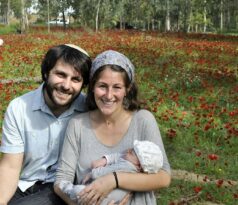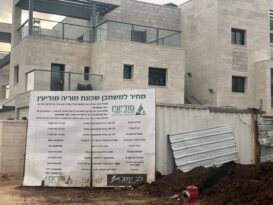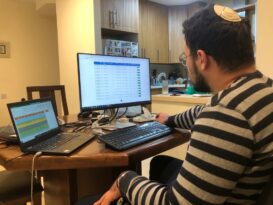The grant will be given to first-time homebuyers purchasing apartments of up to NIS 700,00 located in remote towns and cities in the periphery, including Tiberias, Nahariya, and Eilat. Since the 2021 budget has not yet been approved, the implementation of the program will be limited in scope. Financial commentators warn that it may lead to an increase in real estate prices in the periphery.
In continued efforts to solve the housing crisis in Israel, following the approval of the “Mechir Mufchat” plan earlier this month, which guarantees eligible participants discounted prices for new homes, the government has approved another program. Drawn up by the Minister of Housing and Construction, MK Yaakov Litzman, the plan is to provide grants of NIS 100,000 to first-time homebuyers, or non-homeowners, purchasing second-hand apartments in peripheral cities. The goal of the program is twofold: to encourage the demand for apartments in “National Priority Areas” and to enable young families to purchase their first apartment. The plan received unanimous support from the government, shortly before the recent dissolution of the Knesset which turned the current government into an interim government and spurred general elections, expected to take place on March 23, 2021. A question mark remains over the extent to which the plan will ultimately be implemented, considering the State budget for 2021 has not yet been approved.
The terms of the plan include apartments of a particular size and price in specific areas
The plan is reserved for non-homeowners and does not include investors or home improvers. Grants will only be awarded for apartments located in cities and towns included in the list of National Priority Areas, updated annually based on geographic and socio-economic parameters. The vast majority of these places are in Israel’s remote peripheral regions, including the Galilee, the Golan Heights, the Jordan Valley, the Southern Negev, and the Arava. The current list includes Eilat, Arad, Tiberias, Nahariya, Acre, Ofakim, Beit She’an, Dimona, Migdal Haemek, Carmiel, and more, as well as many minority localities in the Galilee and the Negev.
In order to be eligible for the grant, the apartment being purchased must be larger than 40 square meters and cost between NIS 250,000 and NIS 700,000. The apartment cannot be paid for by a relative, and the transaction must include all current and future rights of the apartment. The value of the property will be examined by an appraiser from either the bank from which the mortgage will be taken or the bank where the buyer is registered. The participants, first-time homebuyers, or non-homeowners, must commit to owning the apartment for at least five years from the receipt of the grant.
Recipients of the grant will be selected through a lottery of eligible registrants
The program will be carried out in a similar manner as the Buyer’s Price plan (mechir l’mishtaken). The Ministry of Housing is expected to open up registration to eligible buyers in the near future, and on a not-yet-finalized date toward the end of January, there will be a raffle to determine in what order registrants will receive the grant. The outcome will reflect the budgetary constraints of the plan, since as long as the 2021 budget awaits approval, between NIS 10-20 million will be allocated toward this program. In such a scenario, the first 100-200 registrants pulled in the lottery will receive the grant.
After the raffle, the lucky first-time homebuyers will be able to purchase an apartment based on the terms of the plan, submit the contract to the Ministry of Housing for approval, and ultimately receive the grant. The Ministry of Housing is aware that the financial scope is currently limited and is currently working to receive a larger budget for the program.
Who is eligible to participate in the program?
There is no requirement for buyers to meet a threshold of earnings or to have completed military service in Israel. According to The Ministry of Housing, in order to purchase a home under the new program, qualified participants must have an Israeli identity card and fulfill the following criteria:
- individuals (single, divorced or widowed) aged 35 and older, or married couples of any age (unmarried couples may also qualify under certain conditions);
- couples that are registered to get married within 3 months;
- first-time homebuyers, or non-homeowners who have not owned an apartment, or a portion (larger than one third) of an apartment, in the last 3 years;
- have not rented an apartment under the Tenant Protection Law (demei mafteach) in the last 6 years;
- do not own any right to a housing unit on a farm, an agricultural piece of land, or in a communal settlement.
- do not own rights to an apartment under construction.
Single parents with at least one child under the age of 21 – who lives with the parent on a regular basis – may also qualify. This includes a single parent who owned the rights of up to 50% of an apartment that was sold following a divorce, or who is still married but sold the rights prior to a divorce and had no additional rights in accordance with the definitions above 6 years prior to the date of application.
Disabled people aged 21 and above who are registered with the Ministry of Health as wheelchair-bound or with a permanent disability rate of 75% or more are also eligible to participate.
Critics warn that the sectarian plan may lead to a jump in real estate prices
The Israeli financial press has criticized Litzman’s plan for first-time homebuyers, warning that it may do more harm than good. An article in “Globes” pointed out that similar programs in the past have actually led to an increase in apartment prices in those areas. The most prominent example is the “Jerusalem Grant,” a 2013 plan that awarded close to NIS 100,000 to buyers of new apartments in the capital city. The grant led to an increase in demand, causing a rise in prices that ultimately sent a significant portion of the grants straight into the pockets of developers.
In addition, many claim that the plan is sectarian, accusing the ultra-Orthodox MK of seeking to benefit his own community. This sector is characterized by a low average income and a high birthrate, which has caused many families to move to remote peripheral cities where they can afford to buy apartments. Indeed, cities like Tiberias in the Galilee and Arad in the Negev have seen a large influx of ultra-Orthodox families in recent years.
Litzman hopes the plan will build up the country, stimulate the market, and support non-homeowners.
Following the approval of the plan by the government, MK Litzman hailed the first-time homebuyer’s program as “another step forward for the periphery – from Kiryat Shmona, through the Arava, all the way to Eilat.” Referencing the financial crisis of the past year, he continued: “Now more than ever, it is important to stimulate the housing market and provide significant financial aid for young families interested in building their homes in the periphery. I am grateful to the Minister of Finance, Israel Katz, for his support in the advancement of the periphery.”







